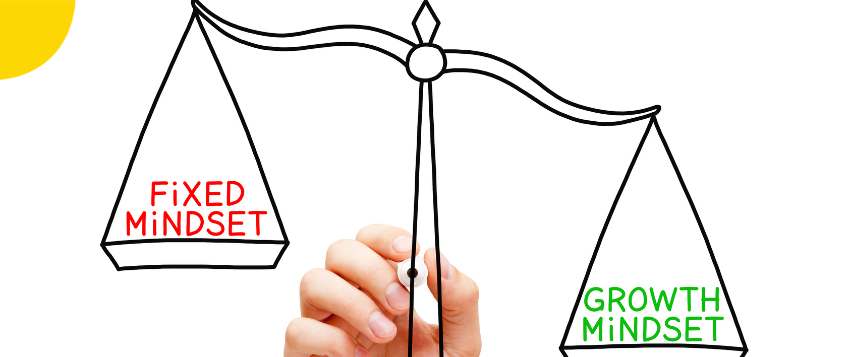“I’m not familiar with that, but I excel at this, so I’ll stick to what I know best,” or “I welcome challenges; let’s explore and see what I can achieve.” We’ve seen this quite often in the workplace or just in life. When you come across something like this, what do you do? Do you give the responsibility or opportunity to the one who’s willing to take on the challenge and neglect the other one who wants to stick to their comfort zone? Many would choose to entrust the opportunity to the one who’s willing to learn and put in more effort, as it makes sense. In this article, we will explore how leaders can embrace a growth mindset and empower employees to conquer the limiting aspects of a fixed mindset.
What is a Fixed Mindset?
Renowned American psychologist Carol Dweck, known for her groundbreaking work on human motivation, wrote a book titled ‘Mindset: The New Psychology of Success’, where she describes a fixed mindset as a belief that one’s qualities are carved in stone, creating an urgency to prove oneself repeatedly. In this mindset, talent is perceived as sufficient for achieving success, and the effort to improve these talents is deemed unnecessary, as one believes they are born with a fixed amount of skill and intelligence. Now, let’s take a look at the personality traits commonly associated with people who exhibit a fixed mindset:
Traits of a Person with a Fixed Mindset
- Avoiding Challenges: People with a fixed mindset may decline to take on new projects or responsibilities that are outside their comfort zone. They fear failure and prefer to stick to tasks they are already familiar with.
- Seeing Effort as Pointless: They might believe that no matter how hard they try, they won’t be able to improve or succeed. As a result, they may not invest much effort in their work.
- Giving Up Easily: When faced with a difficult problem or obstacle, they’re more likely to give up quickly and may feel discouraged, thinking they lack the necessary skills to overcome the challenge.
- Defensiveness in the Face of Feedback: They may become defensive or dismissive when receiving feedback, as they perceive it as a personal attack on their abilities rather than an opportunity for growth.
- Comparing Themselves to Others: They tend to compare themselves to others and feel threatened by those who they perceive as more talented or successful.
While it may be tempting to let go of employees with this mindset, remember that every person has the capacity to evolve and improve. Supporting such employees can lead to remarkable transformations, both personally and professionally. As you guide them towards their greatness, you contribute to a culture of empowerment, trust, and collaboration, where they feel valued and motivated to contribute their best.
In the end, investing in your employees’ growth not only enhances their individual journeys but also strengthens the overall fabric of the organisation.
What is a Growth Mindset?
On the other hand, those with a growth mindset believe that abilities can be developed—they are more likely to see effort as something that propels learning and see setbacks as opportunities to build new skills. Let’s take the personality traits of people with this mindset:
Traits of a Person with a Growth Mindset
A person with a growth mindset exhibits several key traits that distinguish them from those with a fixed mindset. These traits include:
- Embracing Challenges: They see challenges as opportunities for growth and learning. They willingly take on new tasks and are not afraid to step out of their comfort zones.
- Persistent Effort: People with a growth mindset understand that effort is essential for improvement and success. They are willing to invest time and energy into their endeavours, even when faced with setbacks. They view progress as a journey rather than a fixed destination.
- Resilience in the Face of Setbacks: They view setbacks and failures as part of the learning process. They bounce back from challenges with renewed determination.
- Taking Risks: People with a growth mindset are more willing to take calculated risks. They understand that taking risks can lead to valuable learning experiences and growth opportunities.
- Resisting Comparison: They focus on their own progress and development, rather than comparing themselves to others. They understand that everyone’s journey is unique.
- Belief in Self-improvement: They firmly believe that they can improve and develop their abilities through dedication and hard work. They have confidence in their capacity for growth.
Leaders can embrace employees with a growth mindset and foster a positive and forward-thinking outlook within their teams. By encouraging and supporting their employees’ pursuit of learning and improvement, they can create an environment where challenges are seen as opportunities for growth.
On the other hand, leaders with a growth mindset inspire their team members to develop resilience and persevere through setbacks, demonstrating the belief that continuous improvement is achievable. They actively seek opportunities for professional development for their employees, recognising that investing in their growth enhances both individual and team performance.
How to Foster a Growth Mindset
To foster a growth mindset, as emphasised by psychologist Carol Dweck in her book “Mindset,” success relies on the right mindset rather than intelligence, talent, or education. Creating a learning culture, leading by example, and providing constructive feedback are crucial steps. Acknowledging effort and progress, rewarding a growth mindset, and encouraging collaboration are also vital.
By addressing fixed mindset beliefs with empathy, leaders can cultivate a motivated and resilient workforce that embraces challenges as opportunities for growth and success. A growth mindset culture fosters higher employee retention and satisfaction, as employees feel valued and supported in their development journey. This sense of investment and empowerment leads to a greater sense of fulfilment and commitment to the organisation.
Conclusion
In his Secrets of Success book, Chairperson of Regenesys Dr Marko Saravanja says, “Accept that obstacles are there to make you stronger. Instead of complaining, welcome obstacles with humility and gratitude. Without obstacles in your life, you will not grow, and you will not achieve your full potential. The larger the obstacles, the greater the growth.”
Whether you’re a leader, entrepreneur, employee, or anyone else, your mindset can either unlock your potential or hold you back.
For more information on Secrets of Success, click here.
REFERENCES
- Dweck, C. S. (2006). Mindset: The New Psychology of Success. New York: Random House Publishing Group.
- Association for Psychological Science (2019) Carol Dweck on How Growth Mindsets Can Bear Fruit in the Classroom
- The Glossary of Education Forum (2013) GROWTH MINDSET
- Mind Tools Dweck’s Fixed and Growth Mindsets
- Secrets of Success (2021)
- Top Hat Glossary: Fixed Mindset












